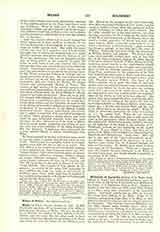

Hildebert of Lavardin, Bishop of Le Mans, Archbishop of Tours, and celebrated medieval poet; b. about 1056, at the Castle of Lavardin near Montoir on the Loire; d. December 8, 1133 or 1134. Nothing is known of him until the year 1085, when Hoel, Bishop of Le Mans, made him scholasticus at his cathedral school. Appointed archdeacon in 1091, he became five years later Bishop of Le Mans. Some of his enemies, among them Duke Elias of Le Mans, in their efforts to prevent his election, did not scruple to blacken his character. The relations between Hildebert and the duke became more friendly later. After the taking of Le Mans by William II of England in 1099, Hildebert was summoned to England by the king who suspected him of aiding the Duke of Le Mans in opposing the English rule. In 1100 he was permitted to return to his see. A year later he went to Rome, having authorized Henry of Lausanne to preach in the cathedral of Le Mans. Henry made use of this opportunity to spread heretical and revolutionary doctrines so that Hildebert on his return thought it necessary to banish him from the diocese. When new hostilities broke out between England and France in 1111, Hildebert was made prisoner at Nogent and held in custody, until the end of the war in 1113. He was present at the Synod of Reims in 1119, at the First Lateran Council in 1123, and probably also at the Lateran Synod of 1116. He rebuilt the cathedral of Le Mans which was consecrated in 1120. In 1125 he was appointed Archbishop of Tours. In this capacity he strenuously defended the rights of the Church against the encroachments of Louis VI of France, who arrogated to himself the right to appoint an archdeacon and a dean for the Church of Tours. He also came in conflict with Bishop Balderic of Dol concerning the jurisdiction over some Breton dioceses. In October, 1127, he presided at the provincial Synod of Nantes, the decrees of which were ratified by Pope Honorius II on May 20, 1128, at the request of Hildebert. At this synod legislation was passed against incestuous marriages, the conferring of Holy orders upon sons of ecclesiastics, and the obtaining of ecclesiastical benefices by inheritance (see Mansi, XXI, 351-4). When the schism occurred after the death of Honorius II, Hildebert temporarily adhered to the antipope, Anacletus II. Through the efforts of St. Bernard he was convinced of his error and became a supporter of Innocent II. Hildebert was learned and pious and always had the wellbeing of the Church at heart Some writers call him venerable, and St. Bernard styles him a great pillar of the Church, tanta ecclesice columna (Mabillon, “S. Bernardi opera omnia”, Epistola cxxiv).
Besides being one of the greatest hymnologists of the Middle Ages, Hildebert is the author of numerous works in prose. His writings were edited by the Maurist Beaugendre: “Venerabilis Hildeberti opera tam edita quam inedita”, Paris, 1708, and with some additions by Bourasse in Migne, P.L., CLXXI, 1-1453. But both of these editions are uncritical and contain many works that were not written by Hildebert. The following prose works of Hildebert have been proved to be genuine: most of the epistles (P.L., CLXXI, 141-312); the life of Queen Radegundis (ibid., 967-88; and Acta SS., August, III, 83-92); the life of St. Hugh of Cluny (P.L., CLIX, 857-94; and Acta SS., April, III, 634-48); the ascetical treatise “De querimonia et conflictu carnis et spiritus” (P.L., CLXXI, 989-1004); and four sermons. Of the poetical works at least the following are genuine: “Versus de mysterio missiae” (P.L., CIIXXI, 1177-96); “De operibus sex dierum” (ibid., 1213-18); “Inscriptionum christianarum libellus” (ibid., 1281-88); “Vita Beatae Marine Aegyptiacae” (ibid., 1321-40); likewise nos. 40, 43, 50-54, 58, 63, 64, 71, 75, 79, 106, 110, 112, 127, 130, 140 of “Carmina miscellanea” (ibid., 1381-1442); and nos. 2, 4, and 14 of “Carmina indifferentia” (ibid., 1442-48); probably also “Historia de Mahomete” (ibid., 1345-66), and numerous other poems and prose writings, the genuineness of which has not yet been sufficiently established.
MICHAEL OTT

